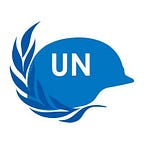Carving a path to peace in Sierra Leone
By Francis Mustapha Kaikai
The United Nations Mission in Sierra Leone (UNAMSIL) completed its mandate in December 2005, ending seven years of UN peacekeeping in the country. The Mission helped the Government and people of Sierra Leone rebuild from the ruins of a devastating decade-long conflict. Over the course of the mission’s mandate, Sierra Leone underwent a remarkable turnaround from a war-ravaged country to a state steadily heading towards a future filled with hope and the promise of a better life for its people.
Peacekeepers were a symbol of peace
In 1999, UN peacekeepers arrived in Sierra Leone to oversee a feeble peace process which included monitoring of a shaky ceasefire and supporting a transition to democratic governance. At the time, the country was divided with some parts completely under rebel control. The divisions were so deep that even the national security force was divided. We could no longer hold the country together.
During the initial stages of its deployment, the Mission encountered serious political and military challenges to becoming an effective peacekeeping operation. The mission was not seen as likely to succeed and at one point, in May 2000, it nearly collapsed when rebels from Revolutionary United Front (RUF) kidnapped hundreds of UN peacekeepers and renounced ceasefire in a move that endangered the entire operation. Outraged by the chaos that followed, the international community put pressure on the rebels to respect the ceasefire and imposed sanctions on the sponsors of the RUF. UNAMSIL also launched new mediation efforts and increased troop strength which helped stabilize its operations.
The peacekeepers in UNAMSIL were symbols of peace. The fact that they were supported by the international community restored confidence in Sierra Leoneans. The peacekeeping mission took control of the security landscape, and by early 2002, UNAMSIL disarmed and demobilized more than 75,000 former-combatants, including child soldiers. The mission assisted in the voluntary return of more than half a million refugees and internally displaced persons. It helped the government restore authority and social services in areas previously controlled by rebels, trained thousands of police and constructed dozens of police stations.
Besides supporting security, UNAMSIL monitored and trained Sierra Leoneans in human rights and was instrumental in setting up the Special Court for Sierra Leone to try those responsible for war crimes. Working together with other UN agencies, the mission reconstructed schools and clinics, launched and funded agricultural projects and sponsored free medical clinics in far-flung areas. The country-wide deployment of UN peacekeepers further assisted in creating a space for civil society and NGOs to start thriving in Sierra Leone, encouraging political participation and peacebuilding efforts.
UNAMSIL may have long left, but today, the Government and people of Sierra Leone remain appreciative of the role of countless peacekeepers and the difference they made in Sierra Leone. We were at the brink of collapse and without their dedicated service, it would have been extremely difficult — almost impossible — to forge a lasting peace in Sierra Leone. We are grateful to the peacekeepers who served for UNAMSIL. We wish to honour those who lost their lives in the service of peace in our country and extend our deepest sympathies and gratitude to the families and countries of peacekeepers who died while serving in Sierra Leone.
Peace is priceless
We see sustaining peace as a mission now. And we believe that peacekeeping represents the international community’s effort to ensure stability around the world. That is why Sierra Leone supported the Secretary General’s Action for Peacekeeping (A4P) initiative. Peacekeeping is a noble cause and the only way to maintain international peace and security. Some of the intractable conflicts in Africa today would have been worse without UN Peacekeeping operations. However, collectively the UN and international community must do more to improve the performance of UN peacekeeping, peace enforcement and peacebuilding efforts. Together we must ensure that the UN and its mandate is respected around the world. We would like to urge Member States to promote peace, support peacekeeping and, if possible, support peace enforcement. It is our collective responsibility to protect civilian lives.
We must encourage the peacekeepers serving in different UN missions across the globe to continue their good work. Their work is respected globally and the countries they serve are appreciative of all the hard work and dedication. They must continue to be a force for progress and change in Africa and beyond. The millions of people they serve — and who rely on them — deserve nothing less.
The author is Ambassador Extraordinary and Plenipotentiary and Permanent Representative of Sierra Leone to the United Nations.
